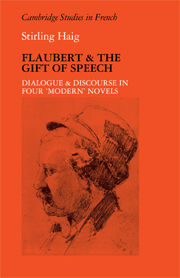Summary
Que donnee nous fut parole Por faire nos voloirs entendre, Por enseignier et por aprendre.
(Le Roman de la rose)La parole fut donnée à l'homme pour cacher sa pensée.
(Talleyrand)“Un dialogue, dans un livre, ne représente pas plus la vérité vraie (absolue) que tout le reste; il faut choisir et y mettre des plans successifs, des gradations et des demi-teintes, comme dans une description.” So wrote Flaubert to Ernest Feydeau on 28 December 1858. In the following paragraph of the letter he urges his correspondent, author of the now forgotten novel Daniel, to tighten up (serrer) his dialogues, and to reduce the secondary ideas: “Pour cela, il faut les reculer, c'est-à-dire les rendre plus courtes et les écrire au style indirect.”
I have shortened two paragraphs to two sentences in order to focus attention on two fundamental points. The first, which is by far the more important, defines Flaubert's attitude towards speech, or more precisely, towards written speech: in a book, he is careful to say, dialogue is an artificial product like the rest; it issues from the writer's pen, thus from his labor, his choice. Highly crafted, dialogue can be compared to a description. Flaubert denies any veristic pretensions, any aspiration to a hyper-mimeticism – “la vérité vraie” – which would belong to the work of the linguist or the dialectician who with the aid of a portable recorder would register on magnetic tape the exact words spoken by one or more informants.
- Type
- Chapter
- Information
- Flaubert and the Gift of SpeechDialogue and Discourse in Four "Modern" Novels, pp. 1 - 21Publisher: Cambridge University PressPrint publication year: 1986

